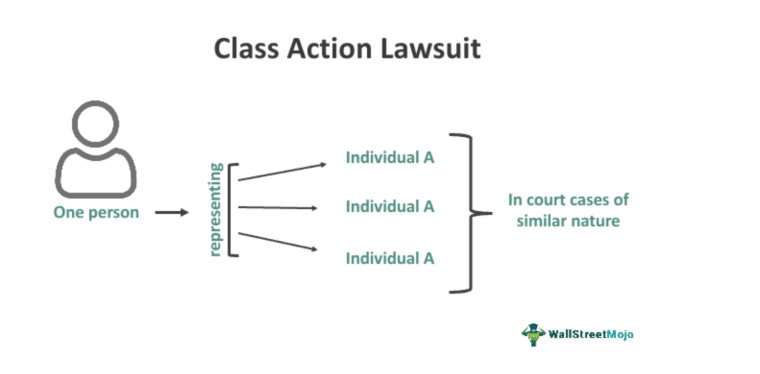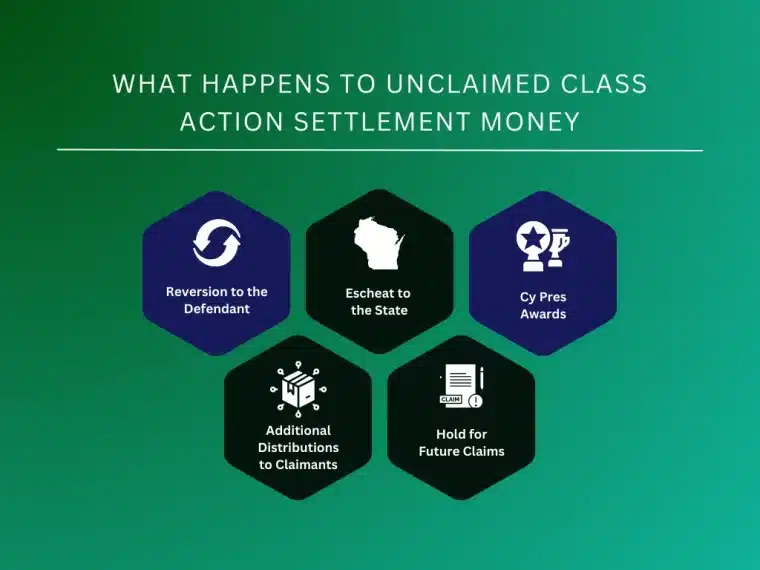A class action lawsuit represents one of the best tools for holding financial institutions, auto manufacturers, social media businesses, and other major corporations accountable for unethical or illegal behavior. In the event that an out-of-court agreement can be reached with the defendant, the suit will transition into a settlement period, during which eligible class members can file a claim and recover funds.
However, class action settlements don’t stay open forever. And once the window of opportunity closes, any remaining funds will be classified as “unclaimed.” Every year, millions of dollars in uncashed checks from class action settlements go unclaimed, with affected consumers missing out simply because they don’t know about the money or how to claim their share.
With that in mind, we’ve created the following guide to help you understand where and how to obtain unclaimed money from class action settlements.
What Are Unclaimed Money Class Action Settlements?

At its core, a class action lawsuit is a legal case wherein a group of people with similar claims band together to sue a company or organization. Such legal action is often taken due to faulty products, unfair business practices, and data breaches, among other reasons. And instead of each person filing a lawsuit on their own, they join a class action, an approach that is far more efficient and has a greater chance of success due to the collective power of the group.
Successful class action lawsuits generally result in a settlement, which means the company or organization being sued agrees to pay a certain amount of money to the people who were affected. That money is then divided among the members of the class.
However, not everyone who is entitled to a share of a settlement actually proceeds to claim their share of the money. There are a few reasons why that might be, such as:
- Lack of Awareness: Many people simply don’t know that they’re eligible to receive money from a class action settlement
- Complex Processes: The process of claiming settlement money can sometimes be complicated, requiring ample documentation
- Short Claim Window: Claim windows tend to be quite short
The good news, though, is that the settlement process for these cases is getting somewhat simpler. Usually, the courts will order the defendant to set up a settlement website, which class members can use to apply for funds if they are eligible to file a claim.
The terms of the settlement define how class members are compensated. In some instances, the unclaimed property takes the form of an electronic gift card. In other (read: most) cases, consumers receive checks that they can deposit into their bank accounts. Class action settlements rarely offer direct deposit options due to the complexity that they would involve.
Types of Unclaimed Funds
Although class action lawsuits can be filed against both federal agencies and state government agencies, they are most often filed against private businesses. A few common grounds for filing a class action lawsuit against a business include the following:
Data Breach Settlements
Data breaches have led to several historic class action settlements in recent years. For example, in 2023, Verizon reached an undisclosed settlement with over 63,000 employees due to a data breach that exposed their sensitive information. Similarly, in 2022, Capital One reached a $190 million settlement for a data breach and was also fined $80 million for failing to implement adequate cybersecurity measures.
Both of these cases, however, pale in comparison to Facebook’s $725M class action lawsuit settlement, reached as a result of a data breach that impacted 87 million of the site’s users. While the initial claims window has already closed, plaintiffs filed two appeals notices earlier in 2024, delaying the payout process and potentially prompting the judge to open a second claims window.
Consumer Product Settlements
Many class action claims focus on consumer products. Take Crocs, for instance, which has found itself in legal hot water as plaintiffs allege that the brand engaged in false advertising and fraudulent concealment, failing to disclose issues related to shoe shrinkage. The suit is ongoing, and a settlement hasn’t been reached yet, so if you’ve ever thought that your Crocs seemed to be shrinking, you should keep an eye on the proceedings. You might have a chance to file a claim in the near future.
Digital products can be subject to settlements as well. For example, consumers sued the National Football League (NFL) due to allegations of violating antitrust laws with its “Sunday Ticket” subscription package. The plaintiffs reached a $4.7B settlement with the NFL, but it was recently overturned.
Financial Institution Settlements
Financial institutions are not beyond the risk of being brought under the lens of a class action suit, either. Numerous national and international institutions have been the subject of class action lawsuits.
One of the most recent offenders is USAA, which recently agreed to pay $64.2 million in response to allegations that its banks improperly charged customers high interest rates and other fees that violated federal protections for members of the armed forces.
The organization failed to lower fees or interest rates in accordance with the Servicemembers Civil Relief Act (SCRA), which caused customers’ loan balances and compound interest calculations to be inaccurate.
Real Estate Settlements
Arguably, one of the biggest class action cases of 2024 is the suit against the National Association of Realtors (NAR). Alongside several of the nation’s largest brokerages, the NAR settled for over $730 million. The primary grievance in the case centers around “inflated commission fees.”
Traditionally, seller’s agents charge home sellers a 6% commission, which they then split with the buyer’s agent. Plaintiffs accused the brokerages of violating antitrust laws and conspiring together via anti-competitive agreements. There were also concerns about buyers’ and sellers’ agents giving inflated broker price opinions (BPOs) to raise home values and thereby increase their commission payouts even further.
If you worked with and paid a commission to a brokerage that settled, sold your home between October 31, 2017, and July 23, 2024, and had listed on a multiple listing service (MLS), you may be eligible for compensation.
Other Types of Settlements
Just about any big company that behaves unethically can be targeted with a class action lawsuit. To bring up Verizon again, the company also reached a $100 million settlement with consumers in 2023 to compensate them for questionable service and administrative charges.
There has also been a suit leveraged against the Google Play Store due to claims that the platform misled users about subscription charges. The plaintiffs’ claims resulted in a $700 million settlement.
One of Google’s top competitors, Amazon, has been on the receiving end of multiple class action lawsuits as well. The latest involves its Prime Video platform and recent changes made to its terms of service, which consumers believe constitute a breach of contract. This particular suit is still ongoing, so you should keep an eye on it if you are a Prime Video subscriber.
Even fast food chains aren’t safe from the class action suit. Chick-fil-A, for instance, reached a $4.4 million settlement in response to claims that it overcharged customers for delivery orders. The case applied to California, Florida, Georgia, New Jersey, and New York consumers who ordered Chick-fil-A delivery via the company’s website or mobile app between November 1, 2019 and April 30, 2021.
How to Find Unclaimed Class Action Lawsuit Money
There are several websites dedicated to helping the rightful owners of unclaimed funds find open settlements. Classaction.org is one of the most popular, featuring an extensive list of class action lawsuits along with detailed information for determining eligibility.
Top Class Actions maintains a similar database of open settlements and helps simplify the claim submission process. It lists open settlements, filing deadlines, and payout amounts.
You can also use unclaimed.org, a database of unclaimed property managed by the National Association of Unclaimed Property Administrators, to determine which cases still have unobtained funds.
The Settlement Claim Process
Once you’ve discovered unclaimed money that you might be eligible for, it’s time to navigate the claim process. Your first step is to verify your eligibility by ensuring that you meet all criteria. For example, you might need to prove that you purchased a product during a specific time frame or that your personal information was compromised in a data breach.
Next, you’ll need to provide documentation to prove your eligibility, such as receipts or bank statements.
If you are eligible, you’ll then submit a claim form. You can usually do so online, but just make sure to follow all instructions carefully and provide all requested information. Additionally, remember that most settlements have a limited window of time to submit claims. If you miss the deadline, you’ll likely lose your chance to collect your share of a settlement.
Common Challenges in Claiming Funds
One of the biggest hurdles associated with claiming class action funds involves proof of purchase requirements. Consumers may have a tough time tracking down their receipts and bank statements, especially if they are trying to provide documents for transactions that occurred several years ago.
A $45 million Walmart class action lawsuit, for instance, involved purchases made between October 19, 2018, and January 19, 2024. Eligible consumers could receive up to $500 but had to provide receipts to document all of the instances where they were overcharged for certain products in those 5+ years.
Even if they were able to track down the necessary documentation, it wouldn’t do them much good unless they filed a claim within the designated window. Claims periods tend to be short, which means you might miss your opportunity if you aren’t diligent about maintaining documentation.
What Happens to Unclaimed Funds?

If funds aren’t claimed, one of the following outcomes may occur:
Reversion
In some cases, unclaimed funds are given back to the defendant. In other words, the company gets to keep whatever money is left over.
Cy Pres Awards
Many settlements include provisions that allow unclaimed funds to be donated to a charity or other nonprofit organization in the form of a Cy Pres award.
Escheatment
In some instances, unclaimed funds are turned over to state governments through a process called escheatment. The state holds the money in an unclaimed property fund, where it can still be claimed by the rightful owner(s).
Additional Distributions
The courts may order that the remaining funds be distributed to claimants who filed after the deadline. Issuing a second round of distributions can be complex and time-consuming, but it will ensure that affected consumers receive as much compensation as possible.
Hold for Future Claims
Sometimes, though it is rare, the court may order that the funds be held for future claims if there’s reason to believe that such claims may arise.
Open Class Action Lawsuits
By joining an ongoing case, you may be able to receive compensation. Additionally, by joining a class action, you can help support other consumers and hold the culprits accountable.
As such, staying informed about open class action lawsuits is a great way to ensure you don’t miss out on potential settlements. The websites above are great tools for keeping track of ongoing cases.
Legal Considerations
As explained, you must claim any funds within the settlement window. If you submit a claim after the fact, you will not receive any compensation, even if you meet all other filing requirements.
Additionally, keep in mind that you will have to pay taxes on large settlement payments. Make sure to check state and federal laws regarding tax filing requirements so you can avoid late filing penalties.
Tips for Staying Informed
There are multiple ways to stay informed about class action cases. You can sign up for class action newsletters or subscribe to alerts for relevant cases. If you identify an ongoing case you may be eligible to participate in, frequently check back for updates.
Also, check your state’s unclaimed property database. If you missed a filing deadline in a class action lawsuit but the funds were allocated to your state, you may still be able to receive compensation.
Don’t Miss Out on Unclaimed Money
Diligence is key when it comes to unclaimed money from class action settlements. Make it a routine to read up on the latest suits and pay close attention to any ongoing claims that are relevant to you. If you are eligible to obtain compensation, file within the claims window so you can do your part to hold corporations accountable.

